Apple’s policy shift was brought about by regulatory pressure, especially from the EU. The company says developers can now access its previously exclusive technology for payment.
The move which is expected to start with an update in iOS 18.1 could impact the cryptocurrency industry significantly.
Apple Escapes EC’s Huge Fines
Apple’s move comes after antitrust investigations conducted by the EC (European Commission). EC Investigators accuse Apple of restricting other developers of mobile wallets.
Apple thus escapes being fined huge sums by accepting to grant access to its near-field communication technology. Notably, this commitment is binding on Apply for 10 years into the future.
But, the tech giant will have the right to charge “associated fees” and demand commercial agreements, implying that access will only be allowed to developers who comply with strict regulatory and security standards.
Available in Only a Few Countries Starting
The policy will initially be applicable in a few countries such as the US, UK, Brazil and Japan. The EU is currently excluded from the decision for now. However, Apple’s openness could bring about increased global adoption going forward.
Increased Accessibility for the Crypto Community
The effects of this innovation extend beyond payments: it could significantly impact sectors such as retail and loyalty programs, creating new opportunities for businesses and consumers.
For the crypto community, this situation could bring about a wider adoption of digital currencies by making them more accessible and user-friendly on a widely used platform like the iPhone.
The move could have effects on platforms such as Solana and Ethereum’s L2 offerings that are capable of transactions made at a high speed and low cost.
Solana is efficient when it comes to rapid finality and lower fee charges, which strengthens its case for wider use in mobile payments.
Accelerated Blockchain Integration

Meanwhile, despite being characterized by fluctuating fees, Ethereum’s Layer 2 solutions still offer greater scalability and cost-effectiveness when compared with conventional methods of payment.
Apple’s new policy could fast-track competitiveness among blockchain systems in terms of achieving a seamless integration with traditional technologies.
One advantage of this is improvements in the adoption and usage of cryptocurrencies for payments.
People who hold cryptocurrencies may settle for the likes of Ethereum’s Layer 2 solutions and Solana due to their transactional speed and lower charges.
This may particularly be the case for the mobile sector where the need to be efficient and fast is vital.
Uncertainty Lingers About Apple’s Transaction Costs
Potentially, this Apple decision can expand cryptocurrency usage for day-to-day payments. However, there is still some uncertainty with respect to what Apple will charge as transaction costs.
In summary, Apple’s new policy means that crypto industry (and other) developers can now access the NFC chip for transit fares, in-store payments, and other crypto uses.
It could also induce a more seamless integration between cryptocurrency wallets and iPhones, thus allowing users to make crypto transactions as easily as transacting with fiat money.










